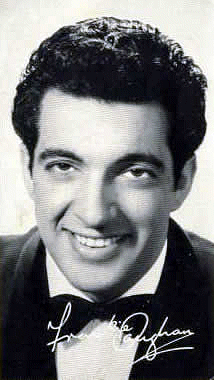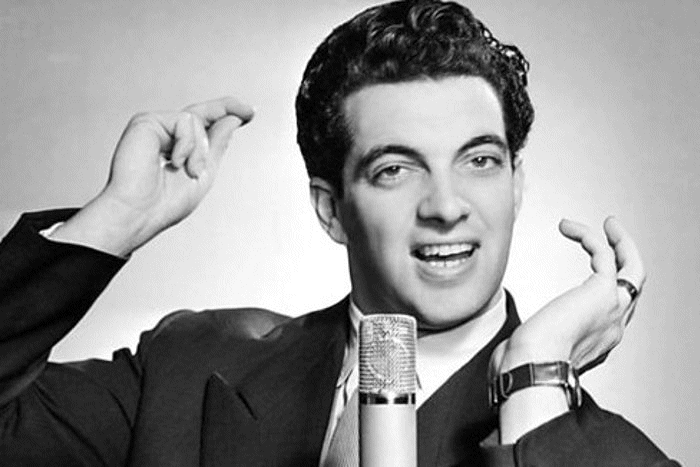Sixties
City presents
a wide-ranging series of
articles on all aspects of the Sixties, penned by the creator of the iconic
60s music paper Mersey
Beat
|
Sixties
City presents
a wide-ranging series of
articles on all aspects of the Sixties, penned by the creator of the iconic
60s music paper Mersey
Beat
|
|||||
|
 |
Frank Abelson
was born in his grandmother's house at 37 Devon Street, Liverpool, on 3rd
February 1928, his father was an upholsterer, his mother a seamstress. Frankie
took his surname after his Russian grandmother kept calling him 'my number
vorn grandson' with her efforts to say 'one' sounding like 'vaughan'. His
grandmother had come to England from Russia at the age of 21 with her two
children, while her husband went on to live in America. Frankie was to describe
the area he was reared in as "a real Cohen and Kelly district, a place where
the Jews and the Irish have rubbed shoulders for years". Frankie attended
Harrison-Jones School and also joined the choir at Princes Road Synagogue,
although he was more interested in sport. The family were evacuated when
their home was bombed, with Frankie initially being sent to Endmoor, near
Kendall, Westmoreland, but reunited with the rest of his family in Lancaster
where he was sent to the Lancaster Boy's National School where he was taught
boxing. It was here that Frankie developed his life-long interest in the boy's club movement and he was later to give the entire royalties from three of his hits - 'Seventeen', 'The Green Door' and 'Something In The Bank, Frank', to the movement. At the age of 14 he won a scholarship to the Lancaster School of Art where he studied for three years to gain an Art Master's degree - and he also captained the soccer eleven. After gaining his degree he was to join the Royal Army Medical Corps during his stint of National Service. On being demobbed he became a student teacher at Leeds College of Art. During a Rag Day show he performed a medley of Al Jolson numbers and was spotted by BBC producer Barney Coleham who advised him to become an entertainer. He also gave him a letter of introduction to Billy Marsh of the Bernard Delfont Agency in London. Initially, Frankie didn't bother with it, being much more interested in art and design. Myra, one of his three sisters, introduced him to her friend Stella at the Locarno ballroom, Leeds, and the two became engaged 15 months later. At one point Frankie sang with a big band in Leeds and was offered a long-term contract, but rejected it in favour of design. When he received some money for a furniture design he decided to go to London to see if he could sell further designs in the capital. He was unsuccessful, but while there he found the letter of introduction and went to the Delfont Agency to see Billy Marsh and successfully auditioned. He was then offered a ten-minute spot at the Kingston Empire. His performance ignited the audience, he was moved to top of the bill and the theatre manager phoned Marsh to come along and see Frankie's act. As a result, he was booked as top of the bill in Manchester at a staggering £100 a week. When he began touring he was told by variety artist Hetty King to change his style of dressing, which she considered sloppy. She advised him to adopt top hat and tails, which he did. By this time Marsh had suggested that Frankie change his surname to one which had a better ring to it and Frankie remembered his Granny's favourite expression 'You are my number vorn' - and Frankie Vaughan was born. Eager to earn enough money to get married, Frankie studied the careers of British and American artists and saw that the big stars made their names in records, television or radio. He decided to stop touring the small provincial theatres and tried to break into the recording and television market, initially without success. Despite that, he and Stella were married on 6th June 1951 and took a tiny two-roomed flat in Soho. Finally, he managed to be given an opportunity with HMV by recording with the Ken Mackintosh Orchestra on the numbers 'Strange' and 'My Sweetie Went Away'. He received a penny per record and the disc sold 8,000 copies after being plugged on Jack Jackson's 'Record Round-Up'. His next release 'No Help Wanted' was played on 'Housewives Choice' and soon several disc jockeys, including Jean Metcalfe and Sam Costa, were playing his records. As a result he was given a top-of-the-bill tour on the Moss Empires circuit, Britain's major theatre group - at a huge salary. The married couple were able to move to St John's Wood. Frankie had been advised to keep his marriage secret with the words, "The fans won't like it if they knew you were married. They prefer their stars to be single", but when his son David was born in October 1953, he announced it to the world. 1955 saw Frankie starring in 'Wildfire', a major ice show at Earls Court, having to learn to skate and sing at the same time, singing songs such as 'Give Me The Moonlight, Give Me the Girl'. This song, which he discovered in a Glasgow music store and sang on stage for the first time in a top hat borrowed from an undertaker, became Frankie's signature tune and led to him being given the nickname 'Mr Moonlight'. He then made his film debut in 'Ramsbottom Sings Again' which starred Liverpool comedian Arthur Askey. |
| Television
shows and more recordings followed and Frankie was also able to utilise
a lot of his spare time working on behalf of the Boys Club movement. 25th
May 1956 saw the birth of his daughter, Susan, during his appearance in
Blackpool and after the show he rushed down to Queen Charlotte's Hospital
in London to see his newly born daughter. He then received a call from film
actress Anna Neagle and director Herbert Wilcox inviting him to join a discussion
on a new film they were making. Frankie told them about his early life in Liverpool and the problems youngsters had, especially those who were waiting to do their National Service. As a result Neagle and Wilcox asked him if he'd be interested in starring in a film based on his experiences. Jack Trevor Story penned the script and the film was called 'These Dangerous Years'. The character of Dave Wyman suited Frankie down to the ground and he performed several numbers in the movie, including 'These Dangerous Years', 'Cold, Cold Shower' and 'Isn't This A Lovely Evening'. In the meantime, he had two major chart hits, 'The Green Door' and 'The Garden of Eden' and prior to the film's world premiere in Liverpool in June 1957, appeared on a tour of leading theatres and starred in the BBC TV series 'The Frankie Vaughan Show', the first time that a pop star had ever been given his own series by the BBC. To promote the film, called 'Dangerous Youth' in America, he travelled to the States and appeared on 'The Ed Sullivan Show' and 'The Perry Como Show' and was also offered starring roles in a Hollywood musical and a Broadway show. He returned to Britain for his 'Frankie Vaughan Show' which was to open for four weeks at the Palace Theatre, London, where it broke box office records. His next film for Anna Neagle and Herbert Wilcox was 'Wonderful Things', in which he played a Gibraltar fisherman who arrives in London to seek his fortune. Frankie then returned to America to appear on 'The Big Record Show', 'The Dick Clark Show' and 'The Ed Sullivan Programme' and was immediately asked to do return engagements, although he interrupted his American trip to return to London to be presented with an award as 'Show Business Personality of the Year' by the Variety Club of Great Britain. His next film for Neagle and Wilcox was 'The Lady Is a Square' in 1959. In 1960 he left for America to star in 'Let's Make Love' with Marilyn Monroe, during which he sang the numbers 'Hey You With The Crazy Eyes' and 'Incurably Romantic'. There were rumours that he rejected her advances, but the story is probably apocryphal. He didn't really want a Hollywood career and preferred to remain close to his family in Britain. Frankie's other films included 'Escape In The Sun' (1956), 'The Heart Of A Man' (1959) and 'The Right Approach' (1960). During the 1960s, following an appearance in Glasgow, he was appalled at the level of violence in the city and met with members of gangs to ask them to put aside their weapons. He became personally involved in raising funds, making appearances and trying to help youngsters in Easterhouse, on the outskirts of Glasgow and will be remembered for his work on 'The Easterhouse Project'. Frankie also found success in London's West End in 1985 when he starred in the stage musical '42nd Street'. He suffered pains in his abdomen but turned down medical help as he wanted to continue working. However, he developed peritonitis and had to leave the cast of the show. He also suffered from a ruptured artery in October 1992 and later underwent six operations because of heart conditions. Frankie died of heart failure on Friday September 17th 1999 at his home near High Wycombe. He was 71 years old. He had once said, "I am lucky to have a talent, lucky to have met such a wonderful girl as my wife Stella, lucky to have such a wonderful family, and lucky to have a job I adore". |
 |
|
Article
Text
UK
web hosting by
|